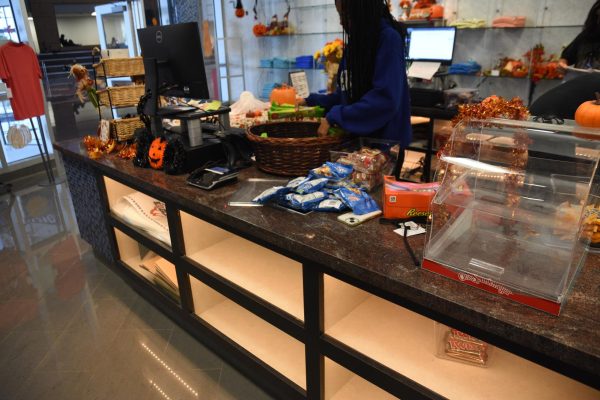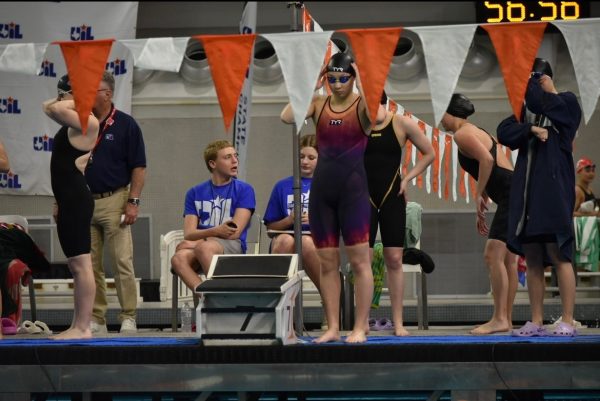High school
Side effects may include stress, sleep deprivation, anxiety and depression.
“I’m exhausted.” “I’m not sleeping well.” “I’m feeling down.” “I’m so behind in my grades, this is new for me.” “I don’t know what’s wrong with me.” “I don’t know what’s wrong with me.”
These are the words repeated over and over in support counselor Jennifer Atencio’s office. Students who are anxious and depressed from the stresses of school come here to look for answers as to why high school has suddenly become such an overwhelming task.
Anxiety and Depression
The National Institute of Mental Health revealed in a survey that about eight percent of teens ages 13 to 18 have an anxiety disorder, a number supported by psychologist Robert Leahy’s claim that today’s average high school student has the same level of anxiety as the average psychiatric patient in the early 1950s.
A part of this 8 percent is junior Kaylee White. She was diagnosed with anxiety in ninth grade and depression in 11th. Symptoms of both disorders can include headaches, muscle tension, clammy hands, tightness of the chest, difficulty breathing and, in extreme cases, panic attacks.
The pressures of advanced classes and band built up to the point where she had her first public panic attack one day when her antidepressants stopped working. This was during her sophomore year, and the panic attacks continue on today. She said that while the panic attacks themselves only last a few seconds, it is the cycle of anxiety caused by having a panic attack that makes things spiral out of control.
“It’s simple things [that trigger an attack],” White said. “It’s like a pressure cooker, and things just seep out.”
Part-time freshman and sophomore nurse Benny Bolin said he is familiar with panic attacks, usually seeing about two a week. He also said most of the cases he sees are triggered by tests and homework that is not completed. “[Panic attacks] are pretty easy to spot,” Bolin said. “You have to get to the base of the problem, what is going on. You have to see if there is something outside the school or in the school. If it’s the test you just try and get them to calm down, have them sit in a quiet place and have them calm down for a while.” Since her first panic attack sophomore year, White has experienced others in places ranging from football games to classrooms. She said that for her, anxiety is about everything that she cannot control and for now that means school. Bolin said that school and school-related activities are probably the main cause of many students’ anxieties.
“If I didn’t have to do school and band and there was a different way for me to get my education, it would relieve a lot of stress, definitely,” White said. “If I didn’t have to have tests or quizzes or important grades [I would have less stress], but you can’t not go to school.”
Atencio said that when students with anxiety cannot come to school, it only adds to their stress as they then have make-up work to complete in addition to their other responsibilities.
“It’s really hard to just stay on top of things because you just get behind so fast,” White said. “The next time [you go to a class you have missed] the homework is late now or you haven’t finished it or it isn’t good, you didn’t understand it. And then make-up work is extremely hard.”
Atencio said that anxiety also affects school performance by causing a lack of sleep, and that anxiety patients often get trapped in a violent cycle of thoughts when they have nothing to occupy themselves at night.
“The next day [when] you go to school, you’re so tired,” White said. “And the worst feeling is waking up in the morning and feeling bad, still nauseous and beyond tired and really nervous. It’s kind of like an upset stomach throughout your whole body. Everything is out of whack.”
Sleep Deprivation
Sleep deprivation does not affect students just with anxiety. According to the National Sleep Foundation, teens biologically require nine and one-fourth hours of sleep per night, but only eight percent sleep for that much time. In fact about two-thirds of high school students receive no more than seven hours of sleep. With this evidence it is not hard to see why a psychology professor at Vassar College compared teens to “walking zombies.”
Senior Kevin Ruder said he is familiar with sleep loss as a full IB student and a member of the band. He sleeps for an average of four hours each night.
“Eventually your entire cycle of life is messed up,” Ruder said. “You wake up in the morning, you go to school, you come home, you crash, you sleep until about nine, and then you get up and do your homework until school starts the next morning, and the cycle continues until your whole day gets messed up.”
When teenagers sleep for less than seven hours, they may become irritable or agitated, Atencio said, which can even put them at risk for developing anxiety and depression. In addition, she said eating habits are impacted as sleep deprivation causes students to eat less healthy food and more junk food.
Another problem is what teenagers eat or drink to stay up in the first place. According to LIVESTRONG’s website, caffeinated and sugar-filled drinks cause spikes in blood sugar and then a crash later on.
“I have tried all of the staying awake techniques,” Ruder said. “Caffeine works OK, but then you get that crash. With sugar the crash is 10 to 20 times worse. Energy drinks, Five Hour Energy doesn’t work. Red Bull works but goes through your veins eventually.”
Bolin said he sees students suffering from lack of sleep even more frequently than from anxiety. Students will come in complaining of a headache or general exhaustion and simply have to take a nap. He said sleep loss dramatically decreases academic performance and inhibits cognitive reasoning. While aware of the negative side affects of sleep deprivation, Ruder still finds it necessary to stay up in order to complete all of his homework.
“[There are] so many strategies for staying awake,” Ruder said. “From sticking your head in an ice bath of water to setting timers on your phone for every 30 minutes so that if you do fall asleep, you waste no more than 30 minutes in getting all of your homework done. So usually you work all night and sleep through your classes, and you end up falling farther and farther behind. It’s a vicious cycle.”
A more deadly result of sleep loss is car wrecks. In a study by the National Sleep Foundation, drivers ages 17 to 24 who slept less than six hours a night were 20 percent more likely to be involved in a car crash over a two- year period. For this reason Ruder’s mom will not allow him to drive himself to school after staying up past 3 a.m.
“[Sleep deprivation] can cause you to feel kind of loopy,” Atencio said. “You aren’t quite there, which can also be very dangerous where the students are driving.”
Stress
Even with these health implications, Ruder feels the need to push himself to the point of exhaustion.
“I feel pressure that some people need to take higher level classes now,” Ruder said. “You hear of all of these college applicants who are getting accepted who have solved world hunger in Africa or discovered a new way for radiation therapy for cancer, but personally it is just that extra academic rigor that I hope will set me apart from other college applicants.”
Atencio said that while she understands the pressures of applying for college, students shouldn’t be too focused on making it into a certain school.
“No one asks me what my GPA was in high school, no one asks me what my GPA was in college, and rarely do people even ask me where I went to school,” Atencio said. “It’s more about the work you do after you finish school and how effective you are at your job.”
Ruder also said that as someone who is considered smart, he feels additional pressure from his peers to perform well academically, so he is hesitant to drop out of any of his classes, though he has thought about it before.
“Some of it that I think I’ve noticed in students as of late is that they don’t fully have the coping skills that maybe other students have had in the past, which I think kind of increases that anxiety,” Atencio said. “They get overwhelmed and just don’t know what to do with that. They don’t know how to prioritize things or to genuinely say, you know, it’s OK to drop a class to on-level or something like that because they aren’t only feeling the pressure from family, but also that internal pressure that I’ve got to be something, that people will look down on me if I don’t.”
Despite the pressure, Ruder has ways to cope with the stresses of school. Ruder uses a balloon filled with sand as a stress ball, has a collection of IB memes and a rewards system composed of small study breaks and snacks.
“The stress of school, it’s something that you should pay attention to. I don’t think it should go unnoticed,” Ruder said. “I believe that having a more positive attitude will go more towards achieving the actual learning and understanding over the material than just getting the grades associated with the material. If you actually have that desire to learn, it alleviates much of the stress that you probably would encounter.”
For those who visit Atencio and Bolin overcome with the stresses of school, they both advise students to take their health into consideration first.
“It’s important that you be happy and healthy, so if you don’t get into UT or don’t get into the first college of your choice, it’s not going to be the end of your life,” Atencio said. “Sometimes that pressure’s internal, like I have to do this because otherwise I’ll be perceived by my peers as less worthy or less intelligent, but it’s just so much pressure for an 18-year-old that their whole life is hinging on where they go to college.”
story by Laura Hallas // managing editor









